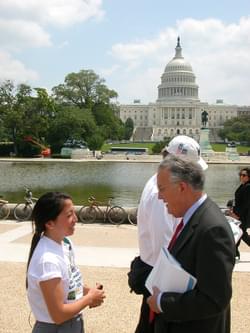




Meeting with a member of Congress or congressional staff is a very effective way to convey a message about your trails, parks, or outdoor recreation issue.

From Americans for Our Heritage and Recreation
Be clear about what it is you want to achieve; determine in advance which member or staff person you need to meet with to achieve your purpose.
When attempting to meet with a member of Congress, contact the Appointment Secretary/Scheduler. Explain your purpose and who you represent. It is easier for congressional staff to arrange a meeting if they know what you wish to discuss and your relationship to the area or interests represented by the member. The phone number for the Capitol Hill Switchboard is (202)-224-3121. Your call can be directed from the switchboard to any Congressional Member's Washington DC Office. Once you get into Washington for the Summit, you may want to call the office to confirm your meeting and leave a number at which you can be reached for the duration of your stay.
| "Wherever possible, demonstrate the connection between what you are requesting and the interests of the member's constituency." |
When it is time to meet with a member, be punctual and be patient. It is not uncommon for a Congressman or Congresswoman to be late, or to have a meeting interrupted, due to the member's crowded schedule. If interruptions do occur, be flexible. When the opportunity presents itself, continue your meeting with a member's staff. Don't be offended if you meet only with the member's staff. Members of congress rely heavily on their staff to keep them informed and help them determine their position on issues. In many cases, staff members make extremely important decisions and are vital allies even when their boss is not available.
Whenever possible, bring to the meeting information and materials supporting your position. Members are required to take positions on many different issues. In some instances, a member may lack important details about the pros and cons of a particular matter. It is therefore helpful to share with the member information and examples that demonstrate clearly the impact or benefits associated with a particular issue or piece of legislation. For UPARR and LWCF, it is particularly useful if you bring proof of how the programs are affecting the Member's district in the form of pictures, stories, or other documentation. In addition, examples of how LWCF and/or UPARR are locally necessary for the fulfillment of future needs can be helpful materials to have along.
Members of Congress want to represent the best interests of their district or state. Wherever possible, demonstrate the connection between what you are requesting and the interests of the member's constituency. If possible, describe for the member how you or your group can be of assistance to him/her, and remind the Washington DC staff of any relationship you have with staff in the district office. Where it is appropriate, remember to ask for a commitment.
While you are visiting your Member to educate them about your issue, you may learn the most by listening to what they or their staff has to say. Be sure you listen to what they know, what their opinion is, and what concerns they have before you present your materials or point of view. You may want to change your approach once you hear where they are coming from on the issue. You are not likely to convince someone to support you with one meeting, but, if you listen, you may learn important information you can take back and use to ultimately gain their support.
Be prepared to answer questions or provide additional information, in the event the member or staff person expresses interest or asks questions. If you don't know the answer-- tell them you will get back to them with the information they need. Follow up the meeting with a thank you letter that outlines the different points covered during the meeting, and send along any additional information and materials requested.
Americans for Our Heritage and Recreation (AHR) is a broad and diverse organization representing conservationists, the recreation and sporting goods industries, park and recreation specialists, wildlife enthusiasts, advocates for urban and wilderness areas, preservationists of cultural and historic sites, land trust advocates, the youth sports community, and civic groups seeking to revitalize the Federal government's Land and Water Conservation Fund (LWCF) and Urban Park and Recreation Recovery Program (UPARR). AHR provides detailed information and updates on these initiatives, directs people to local LWCF-funded projects and shows them ways to get LWCF and UPARR funding for specific projects; and shows how Congress is shaping the debate on open space and recreation issues. For more information, contact Executive Director Tom St. Hilaire:
1300 19th St., N.W.Suite 300 Washington, DC 20036P - 202-454-3370 - [email protected].